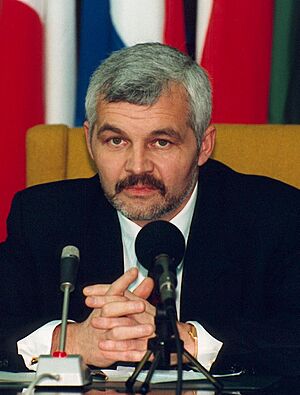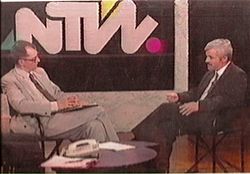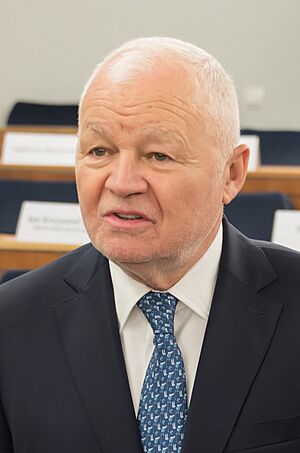Jan Krzysztof Bielecki facts for kids
Quick facts for kids
Jan Krzysztof Bielecki
|
|
|---|---|

Bielecki in 1991
|
|
| Prime Minister of Poland | |
| In office 4 January 1991 – 5 December 1991 |
|
| President | Lech Wałęsa |
| Deputy | Leszek Balcerowicz |
| Preceded by | Tadeusz Mazowiecki |
| Succeeded by | Jan Olszewski |
| Personal details | |
| Born | 3 May 1951 Bydgoszcz, Poland |
| Political party | Solidarity Citizens' Committee (1988–1991) Liberal Democratic Congress (1991–1994) Freedom Union (1994–2001) Civic Platform (2001–present) |
| Alma mater | University of Gdańsk |
| Awards | |
Jan Krzysztof Bielecki (born on 3 May 1951) is a Polish politician and economist. He is known for his ideas about freedom in the economy. In the early 1990s, he was a key leader of the Liberal Democratic Congress party in Gdańsk. Bielecki served as the Prime Minister of Poland for most of 1991. After his time as Prime Minister, he became the president of Bank Pekao from 2003 to 2010. He also led the Polish Institute of International Affairs from 2009 to 2015. Since the early 2000s, Bielecki has been a member of the Civic Platform political party. Many people in Poland see him as one of the country's most respected economists.
Contents
Early Life and Activism
Jan Krzysztof Bielecki was born in Bydgoszcz, Poland, on 3 May 1951. He studied economics related to sea transport at the University of Gdańsk and finished his studies in 1973. For much of the late 1970s, Bielecki worked as an economist in Gdańsk.
In 1980, Bielecki joined the Solidarity movement. This was a large group of people who wanted more freedom and changes in Poland. He helped the movement by providing support behind the scenes. When the government declared martial law in December 1981, which meant strict military control, Bielecki was arrested and held for a short time.
Because of his work with Solidarity, Bielecki was fired from his job and was not allowed to work for the state. After being unemployed for eight months, he found a job as a truck driver. He also secretly continued to help Solidarity by printing flyers and watching police activities for the movement. In 2009, Bielecki spoke about how hard it was for many Solidarity activists back then. He said that many of his friends left Poland because they felt there was no hope. But he and others chose to stay and keep fighting for their pride.
Starting a Business and Entering Politics
While still supporting Solidarity secretly, Bielecki and his friends from the University of Gdańsk decided to use new economic rules from the communist government in the mid-1980s. These rules allowed some private businesses. They noticed that the new laws had many "loopholes," or ways to get around financial and tax rules.
Bielecki started a company called Doradca, which means 'advisor'. It began with almost no money, just him and one secretary. He used his connections from the university to get work with state companies. Since there were very few consulting firms in communist Poland, his connections were very important.
Doradca quickly became good at helping companies with their taxes. The tax rules were confusing, so companies relied on Doradca to help them pay less tax. The company became skilled at finding loopholes to help raise salaries without increasing tax payments. In 1987, Bielecki's team created software to help companies plan their wage taxes. This software became very popular.
By 1988, the government made it easier for Western companies to work with Polish businesses. Doradca was in a good position to help these new companies with Poland's tax and banking rules. At the same time, Bielecki continued to help hire and support underground Solidarity members. During this time, Solidarity activists gave him the nickname "Little Black."
As the communist government was ending, Bielecki and other liberal thinkers from Gdańsk formed a group called the Gdańsk Society for Socio-Economic Development. This group became known as the "Congress Liberals." In the partially free 1989 elections, Bielecki was elected to the Sejm, which is the Polish parliament.
In 1990, as the Solidarity movement split, Bielecki and his friends wanted a more open, free-market approach to change Poland's economy. They formed the Liberal Democratic Congress (KLD) in June 1990. This new party supported selling state-owned companies, growing the free market, and joining with other European countries. The party also supported Lech Wałęsa in the 1990 presidential election.
Prime Minister: 1991
After Prime Minister Tadeusz Mazowiecki resigned in November 1990, newly elected President Lech Wałęsa looked for a new prime minister. Wałęsa first chose Jan Olszewski, but he refused the job. So, Wałęsa then asked Bielecki, who was not very well-known in politics at the time, to form a new government.
Bielecki accepted Wałęsa's ideas for the government. He kept five ministers from the previous government, including Leszek Balcerowicz, who was the Finance Minister. Balcerowicz continued his "shock therapy" plan, which was a quick and big change to the Polish economy. Bielecki then formed a government with his Liberal Democratic Congress and other parties that supported Lech Wałęsa. Bielecki became Prime Minister on 4 January 1991. His government was the first in 47 years where none of its members had worked under the communist system before.
Bielecki's government quickly focused on Poland's international economic situation. In February 1991, he attended the World Economic Forum in Switzerland. There, he asked Western countries to forgive 80 percent of Poland's large foreign debt. Because of these talks, Western European governments agreed to forgive 50 percent of the debt. The United States forgave 70 percent of its share, and Brazil forgave 50 percent. The International Monetary Fund (IMF) and the World Bank also agreed to give Poland loans to help modernize the country.
At home, Bielecki's government worked to undo the old "command economy," where the state controlled everything. In June, his government suggested a huge plan to sell 400 state-owned companies. This was about 25 percent of Poland's industrial sales. The plan said that the Polish state would still control 30 percent of these companies. Every adult citizen would get shares from a national fund, and employees of each company would get ten percent of their company's shares. Also, the Warsaw Stock Exchange opened in April 1991.
Bielecki's economic plan was very controversial, especially among Solidarity activists. In May 1991, nearly 10,000 people protested in Warsaw against the government's quick economic changes. Solidarity also organized strikes across the country.
In foreign policy, Bielecki's government continued to move Poland away from the Eastern Bloc (communist countries) and closer to the West. In February 1991, talks began with the Soviet Union to remove over 50,000 Soviet troops from Poland. The Warsaw Pact, a military alliance, and Comecon, an economic group of communist countries, officially ended in June and July 1991 under Bielecki's leadership.
Negotiations with countries like Belgium, France, Germany, Luxembourg, and the Netherlands successfully removed visa requirements for Polish citizens. In June, Bielecki and German Chancellor Helmut Kohl signed the Treaty of Good Neighbourship. This agreement confirmed the border between Poland and Germany. In November, Poland was invited to join the Council of Europe, an organization that promotes human rights and democracy.
Bielecki's government also suggested big changes to local government. They wanted to divide Poland into counties and regions, similar to the states in Germany. This idea was to give more power to local governments. However, this plan did not become law.
Inside the Sejm (parliament), Bielecki's government faced many challenges. His government was a "minority government," meaning it did not have enough support from members of parliament to easily pass laws. Parliament often voted against his economic and political plans. President Wałęsa wanted the government to have special powers to rule by decree, but Bielecki was hesitant. He instead suggested a "fast lane" for economic laws. However, by June 1991, none of his government's 27 proposed laws had passed.
Bielecki offered to resign, but parliament voted against it. He then pushed for special decree powers for only two months before the parliamentary elections on 27 October. He also suggested giving the president more powers, like choosing and removing the prime minister.
Despite getting half of the parliament to support his ideas, Bielecki did not have the two-thirds majority needed to pass these special powers. With some accusations of corruption in his government and a struggling economy, Bielecki's party had mixed results in the 1991 elections. His party won 37 seats, and Bielecki was elected to parliament from Warsaw. However, no single party won a clear majority, so Bielecki did not have enough support to continue leading the government. He remained Prime Minister until Jan Olszewski took over on 6 December 1991.
After Being Prime Minister
Parliamentary Work
As a member of the Sejm and a leader of the Liberal Democratic Congress, Bielecki continued to support Poland joining more closely with Europe. During his time in parliament after being Prime Minister, he worked on the Committee on Foreign Affairs. In May 1992, he spoke in parliament about Poland joining the European Economic Community, saying it would bring security and freedom for people, goods, and money.
In the early 1990s, Bielecki also strongly supported the Visegrád Group (with Czechoslovakia and Hungary) and Poland joining NATO. In July 1992, he supported Hanna Suchocka becoming prime minister. Suchocka later appointed Bielecki as a minister without a specific department, in charge of relations with the European Community from 1992 to 1993.
Banking and Later Career
Voters were unhappy with the economic difficulties caused by privatization. In the September 1993 elections, Bielecki's Liberal Democratic Congress lost all its seats in parliament. After this big defeat, Bielecki was appointed to the board of directors of the European Bank for Reconstruction and Development (EBRD) in December, where he worked until September 2003.
In 1994, Bielecki helped create the Freedom Union party, which was a middle-ground party that supported the European Union. In 2001, Bielecki joined the Civic Platform party. From 2003 to 2010, he served as president of Bank Pekao.
From 2010 to 2014, Bielecki led the Economic Council for the Prime Minister's Office, after being appointed by Prime Minister Donald Tusk. He also served as the president of the Polish Institute of International Affairs from 2009 to 2015. Bielecki has written articles for several newspapers and magazines, including The Wall Street Journal and Die Welt.
Personal Life
Jan Krzysztof Bielecki is married and has two children. He is well-known for his love of motorcycles. In September 2012, a newspaper photographed Bielecki arriving at work on a BMW F800R motorcycle, dressed in jeans and a jacket. The newspaper noted that even though he could have used a free car for commuting, he preferred his motorcycle.
Bielecki also loves football (soccer) and sometimes shares his thoughts on the game with the media. He is known to play football in his free time with his friend and former prime minister, Donald Tusk. Both Tusk and Bielecki have remained close friends and political allies since their time together in Solidarity in the 1980s. In 2010, he jokingly said about Polish football, "The only area where we are absolute idiots is football!"
Besides his native Polish, Bielecki speaks English fluently and can also speak French and Russian.
Honours and Awards
 South Korea : Grand Gwanghwa Medal of the Order of Diplomatic Service Merit
South Korea : Grand Gwanghwa Medal of the Order of Diplomatic Service Merit Czech Republic
Czech Republic  Slovakia : Czech and Slovak Transatlantic Award
Slovakia : Czech and Slovak Transatlantic Award France : Legion of Honour, Grand Officier
France : Legion of Honour, Grand Officier Poland : Order of the White Eagle, Knight
Poland : Order of the White Eagle, Knight Poland : Bene Merito honorary distinction
Poland : Bene Merito honorary distinction Poland : Kisiel Prize
Poland : Kisiel Prize
See also
 In Spanish: Jan Krzysztof Bielecki para niños
In Spanish: Jan Krzysztof Bielecki para niños
 | James Van Der Zee |
 | Alma Thomas |
 | Ellis Wilson |
 | Margaret Taylor-Burroughs |



